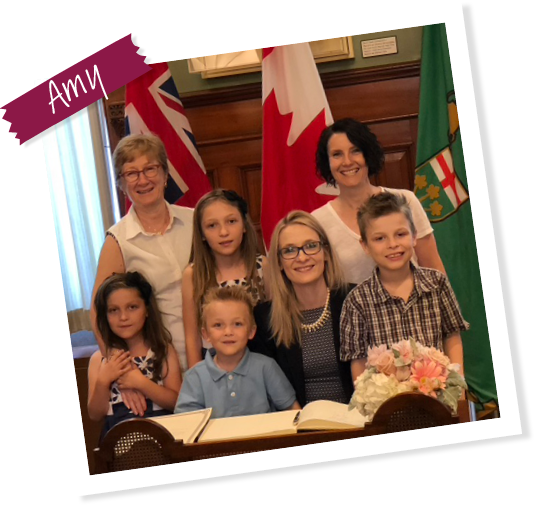Amy Fee, MPP Kitchener South-Hespeler, caring for her children
 I am a Member of Provincial Parliament in Ontario and a single mother of 4 children aged from 9 to 14 years old. Two of my children have autism, one of whom also has celiac disease, and my third child struggles with significant anxiety that really shapes her world. We also have two service dogs with one that is retired and one in active service. COVID-19 has given me an opportunity to spend more time with the kids but has also made for longer days trying to squeeze in everything that needs to be done for the kids and work in 24 hours.
I am a Member of Provincial Parliament in Ontario and a single mother of 4 children aged from 9 to 14 years old. Two of my children have autism, one of whom also has celiac disease, and my third child struggles with significant anxiety that really shapes her world. We also have two service dogs with one that is retired and one in active service. COVID-19 has given me an opportunity to spend more time with the kids but has also made for longer days trying to squeeze in everything that needs to be done for the kids and work in 24 hours.
To give a snapshot of my caregiving journey I will orient it around my 13-year-old son, Kenner, who was diagnosed with autism at 3 years old. There was a lot of fear in the beginning of my caregiving journey because of what the future might hold for Kenner. When he was four years old, a therapist at his school had told us that he would never read or write. She said that she didn’t think he would even be able to print a “K” for Kenner. Today, he has so much language and he researches and learns what he wants. And, he can write and draw.
Kenner needed significant support when he was young and thankfully, I wasn’t working at that time so I could focus more on the care he needed. While he still needs support today, it is at a lesser level. At the beginning, my fear in finding him therapy was that they would mould him into what society wants to see. I was adamant on finding a therapist that would help us make life easier for him, instead of making him fit into what society expects, and I was able to! The first years it was very much like running a business, making sure his team was kept together, that there was the right amount in the accounts to pay people and that the government funding was coming through. During COVID-19, Kenner has phone calls and Zoom calls with a respite worker and was finally able to see her recently which was very exciting for him. Many people in his care team over the years, including his PSWs, CYCWs and autism therapists have been like family to us.
There has also been a lot of support from my mother. She was a special education teacher and would give me tips to help Kenner learn to print and read, and other things like making sure he didn’t get too comfortable with routine. That alone meant there was a lot of rearranging of furniture and changing of schedules in the early years, which meant there were a lot of prolonged meltdowns that we had to work through together. Now Kenner is able to handle not just little changes, but a lot of major changes without extreme build ups of anxiety. It’s amazing to see how much progress he has made.
Kenner still has weeks where he has trouble sleeping so we do a lot of lifting weights or running on the spot in the house in the middle of the night. Patience has been the most important aspect of being a mom and a caregiver, especially in the middle of the night. You have to recognize when you don’t have patience and you need 10 minutes to relax. I am trying to teach the kids that they can do the same. We have also done a lot of explaining and validating our emotions which has served us greatly during times of stress in our home.
Reaching out to find community supports has been the biggest help for me. My child with anxiety has been able to access many resources that are helping her. Special Services at Home is also service we have in Ontario that mainly helps young people with developmental disabilities and their families. That money was used for respite care for two of my children, but when COVID-19 hit this wasn’t possible. We reassessed what this money could be used for to continue providing different forms of respite to caregivers to decrease burnout. We allowed the criteria to be broadened and families used the funds for basketball nets, Netflix subscriptions, soccer balls, and exercise equipment so that caregivers can get that reprieve that they need safely in their homes.
I also would not have been able to do this alone. As I mentioned, my mother has been a huge help for me and the kids. She was a caregiver for many years to her parents and when they passed away, she became a caregiver for her grandchildren. I am very grateful for the part she plays in my kid’s lives. In caregiving, you have to always remember to take care of your own mental health. My friends and family always remind me of caregiver burnout and not to sweat the small stuff. Sometimes you just have to be okay with the fact that when four kids try to play a video game, they are bound to argue.
